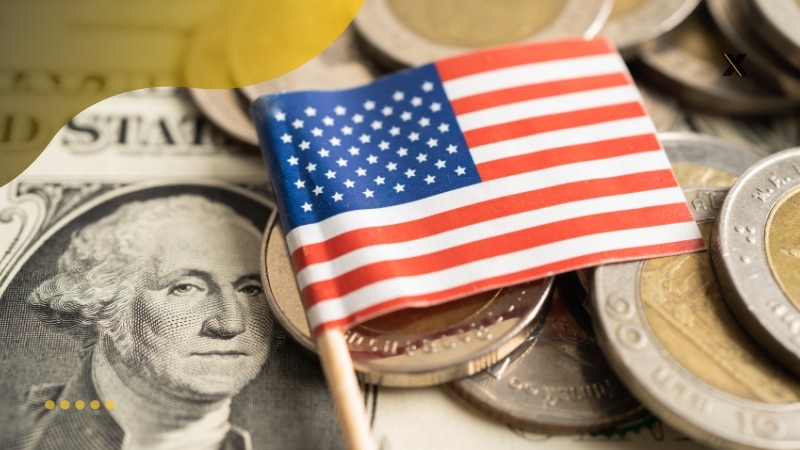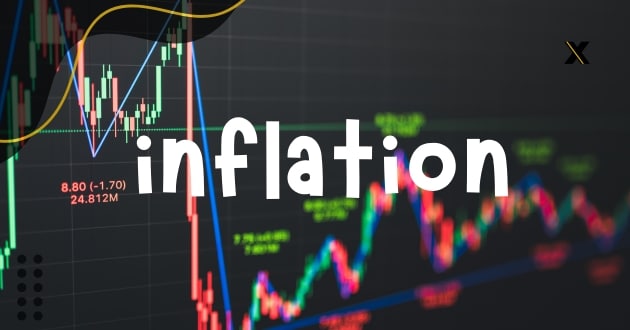Advertisements
Inflation is one of the most impactful economic phenomena, and understanding how inflation affects us economy is crucial for consumers and businesses alike.
Inflation not only decreases the purchasing power of money, but it can also create instability in financial markets. This is by changing the dynamics of prices, wages and investments. For this reason, today, in 5 minutes, you will understand how inflation affects your life and companies.
We will analyze by analyzing the main economic indices used to measure it, as well as the historical and current consequences of this variable for the global economy. That way, you’ll know all about how inflation affects us economy.
What is inflation?

Inflation refers to the rise in the prices of goods and services within an economy over time.
Advertisements
Thus, as the months or years go by, the purchasing power of money decreases, that is, you can buy less with the same amount.
For example, if today a liter of milk costs US$ 4.00 and in a year it will cost US$ 5.50, there was inflation. Realize that you will not be able to purchase the same product for the same amount.
When controlled at around 2% per year, inflation is considered healthy because it stimulates consumption and drives economic growth.
Rapid inflation or extremely low (or negative) inflation, known as deflation, can lead to economic instability.
Advertisements
Price indexes measure inflation by tracking the variation in a basket of products and services over time.
The Bureau of Labor Statistics calculates it in the United States. Through it, the government, companies and consumers are able to understand the behavior of the economy. And make more informed decisions.
Main inflation indices
1. Gross Domestic Product (GDP) Price Index
The Gross Domestic Product (GDP) Price Index is a measure that tracks the change in the prices of goods and services produced within a country.
Economists typically use it to adjust nominal GDP, allowing the comparison of economic growth over the years without inflation distortion.
2. Personal Consumption Expenditure (PCE) Price Index (How Inflation Affects us Economy)
The Personal Consumption Expenditures (PCE) Price Index. Is a measure used by the Federal Reserve (Fed) to monitor inflation in the United States.
In principle, the PCE tracks the variation in prices paid by urban consumers. Including health expenses paid not only by the consumer, but also through health plans and other benefits on behalf of the consumer.
This makes the PCE a more comprehensive measure, since it considers the impact of health expenses paid by third parties.
3. Producer Price Index (PPI)
The Producer Price Index (PPI) measures the average change in the selling prices of goods produced in the United States.
This index tracks the prices paid by producers for goods, including intermediate goods used in production. Not just the price of the final product sold to consumers.
The PPI makes it possible to understand inflationary pressures in the early stages of the production chain.
In addition, the price change reported by the PPI can serve as an early indicator of changes in consumer prices. Since increases in the prices of intermediate goods are usually reflected in the later stages of production and in the final cost to consumers.
This index is calculated by focusing on a specific set of goods and services, or even a specific geographic area.
Although the price variation is presented each year. Data is collected and analyzed on a monthly basis for a more accurate view of changes in costs over time.
Inflation in history: Understand how the main US inflationary waves were
Throughout the history of the United States, there have been several significant waves of inflation. With varying causes and different economic consequences.
- 1960s: during this period, inflation began to increase due to the combination of low unemployment and strong economic growth, driven by the Vietnam War;
- 1970s: High oil prices, driven by crises in the Middle East, triggered expectations of widespread inflation. The rises in energy prices affected other goods and services, resulting in a period of sky-high inflation.
- 1980 to 2020: Inflation in the United States was relatively low and stable, with some fluctuations. Especially during recessions.
- 2022: in that year inflation skyrocketed, reaching the highest level in 40 years. This is due to a combination of factors. For example, increased consumer demand, high government spending, and the war in Ukraine.
In recent years, monetary policy decisions, such as raising interest rates. Have helped reduce inflation, which has begun to gradually fall from its peaks in 2022.
Annual inflation from January 2023 to January 2024 fell from 3.3% to 3.1%, with a continued reduction to 2.4% in September 2024.
Inflation rose again, reaching 3.0% in January 2025, sparking discussions about its trajectory and the possibility of it approaching the Federal Reserve’s (Fed) 2% target.
How does inflation affect you? (How Inflation Affects us Economy)
Inflation affects both consumers and businesses, altering economic dynamics significantly.
When prices increase, the purchasing power of money decreases, that is, it cannot buy the same amount of goods and services with the same amount of money.
Additionally, inflation can create inequality between different groups in society. For example, a person who receives a fixed increase in their retirement of 3% per year would lose purchasing power if inflation were higher than this percentage.
By contrast, someone with a 3% fixed-rate mortgage could benefit from inflation, as payments would become easier as long as their wages kept up with rising inflation.
Because of this, it is important to take good care of your money, to protect your assets, preventing inflation from affecting your investments. To do this, the first step is to follow the best personal finance tips that will help you contract, improve your money and start investing.
Conclusion (How Inflation Affects us Economy)
Inflation is an economic factor that affects both consumers and businesses. Its main factor is the reduction in the purchasing power of the currency.
Additionally, inflation creates an environment of economic uncertainty, where businesses may be hesitant to make new investments, and consumers tend to cut back on their spending.
Therefore, it is relevant to understand how inflation affects the economy. Especially in times of high inflation, so that they can make more informed financial decisions, Thus, they will be able to protect their income, adapting to the moment of the economy.




